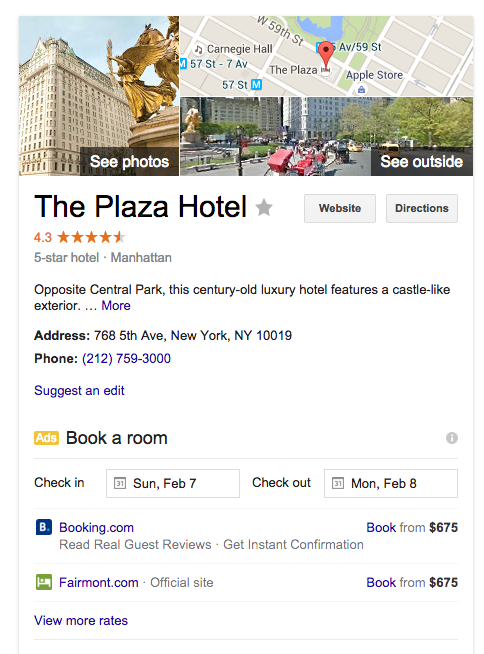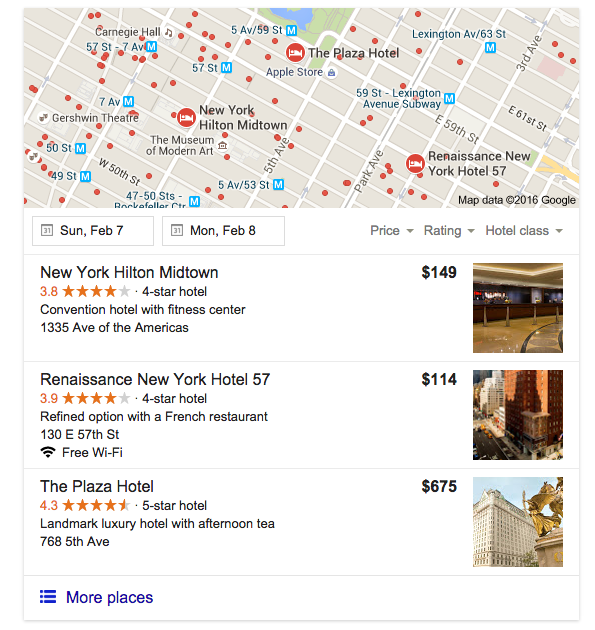Earn More Real Estate on Hotel Search Results Pages
by Meisha Bochicchio
With ever changing SERPs and constant algorithm updates, the thought of keeping up with the digital Joneses can be daunting. Hoteliers, in particular, face a special challenge with the roll out of major hotel SERP changes, the introduction of Google Hotels, and the soon to come introduction of even more competition with OTA and meta-search startups and consolidations.
How can your hotel work to gain more SERP real-estate?
We’ve got the answers.
Natural / Organic
Search Engine Optimization (SEO)
Search engine optimization is a phrase that most marketers are familiar with and involves working with a website to improve the natural ranking for the site within search engines. Sound a bit broad? Well, the truth is, “SEO” encompasses many things that cover the full spectrum of technical tasks and creative elements. Performing hotel SEO will ensure that your website is as search engine and user friendly as possible in all areas of performance and functionality. This includes ensuring proper code implementation (including hotel specific schema markups), keyword research and recommendations, adjusting website content, tags, and meta information, auditing and adjusting the link profile of a website, and generating and distributing content on the website – to name just a few.
The overall goal of SEO is to make your website as search engine and user friendly as possible, ideally increasing the website’s rank for select relevant target keywords. Improving rank for keywords, particularly for non-brand keywords, will help a hotel site bump competition (including those pesky OTAs) and gain more SERP space.
Although rank in search engines is important, it is also incredibly important to set realistic goals and expectations and understand the competitive landscape and how search engines function in the first place. SEO is a long-term solution rather than a short-term fix and a complex understanding of historical algorithm updates and industry best practices is necessary to maintain a successful campaign.
See Also: Top 3 SEO Factors (Podcast)
Social Media Sites
Another way hotels can dominate SERPs, particularly for branded searches, is to maintain a social media presence. Sites like Facebook, Twitter, Google Plus, and even Pinterest are great ways to develop a following and brand loyalty and to connect and interact with present and future guests. Establishing a social media presence is completely free, though it does help to have dedicated internal resources available or a third-party vendor to monitor and manage pages as needed. Inactive or stagnant pages run the risk of losing traction, so don’t set up pages just to let them sit there – use them! Having several well maintained and high-quality social media sites can lead to those sites ranking for branded searches and will ultimately win your hotel more space on the SERPs and knock meta-search sites and OTAs down a few spots.
Review Sites / Online Travel Agents (OTAs)
The third free way to gain more space on hotel SERPs includes dancing with the devil – review sites – which can also end up being sites like OTAs and meta-search sites. While this is not necessarily a bad thing, this SERP opportunity is not the most preferred when it comes to direct traffic and bookings. Though OTA and review listings are popular because consumers blatantly seek and trust reviews and because of the perceived deals they can also find, these listings can also lead consumers to book via the OTA (leaving you with less money from the booking) or it could lead the consumer to another hotel profile altogether. But, at the end of the day, these listings will most likely exist whether you want them there or not and in most cases it is much better to be there than to have a competitor ranking for that SERP spot, so embrace your review presence and work to enhance your profile and to solicit more positive reviews.
Paid
Pay Per Click Ads (PPC)
Ah, paid ads. For those unfamiliar, PPC stands for “pay per click” which describes the pricing model for these types of ads. Google, the largest ad provider and ad network, runs ads through Google AdWords while Bing runs ads through Microsoft Ad Center. Though almost anyone can set up an account and run ads, Google does enforce rules and regulations to monitor activity.
From a PPC for hotels perspective, one has the opportunity to run on both brand and non-brand related search terms, both of which have strategic pros and cons. There are also several targeting options which include running on “interest based targeting” on the Google display network, remarketing, and dynamic remarketing – to name just a few. The main point here is that hotels have plenty of opportunity to gain an ad position within the SERPs by running paid ads. As one might assume, the top three spots see the highest click-through-rate and overall conversion rate, leading to higher direct sales, though “lower” ad spots are typically available along the right side of the screen and at the bottom of the page sometimes as well.
Additionally, hotel brands can protect their brand name by preventing competitors and OTAs from using a brand in their ads. For example, Hilton could contact Google and prevent Hotels.com from using the term “Hilton” in paid ads. This could help a brand maintain more brand authority within a SERP but could also harm traffic generated through these channels, so the strategic decision is not one to take lightly. You can use the Google Trademark Complaint form or AdCenter Trademark misuse form to resolve these issues.
Related: Are You Making These Top 10 Hotel PPC Mistakes? (Podcast)
Google Hotel Ads
Google Hotel Ads are a more recent addition to the SERP lineup and hotel metasearch, and are yet another way for hotels to gain a spot in the limelight.Hotel Ads connects your CRS with Google to directly advertise real-time rates and availability to searchers.
Initially, Google Hotel Ads (formerly “Hotel Price Ads”) could be seen across several spots on the SERP, with Google.com/Hotels being the activity hub. This, as one might imagine, functioned similarly to Google.com/Flights. However, Google has since nixed Google.com/Hotels altogether and has focused on seamlessly integrating the hotel data across both brand and non-brand search queries.
Though Google Hotel Ads can get quite complex when one gets into the bidding and placement algorithms, the meat of the program is the “book now” button that allows a searcher to book a hotel room directly from the SERP. Google currently allows both individual properties, OTA sites, and meta-search sites to provide rates through the program.
The features can get quite detailed, so I will spare you; all you need to know is that, as a hotel, properties will have the opportunity to bid against OTAs for these direct bookings.
Why is this important? Well, Google Hotel Ads are beginning to make more of an appearance across SERPs. These are presented as a rate with a drop down button, as seen at the top of this page.
Or, for branded results, it can appear in the SERP in multiple spots within the organic listing and in the knowledge graph box, as seen here:

Google recently made a rather large change that will make a hotel’s participation and presence even more important. Introducing the “Hotel Three Pack”:

Oh, hello there Google Local profiles. This SERP served on a rather broad search – “New York Hotels” – and is being fully rolled out across all markets. This full screen shot shows three paid listings on top followed by the Google Hotel listings, pushing all other organic listings below the fold.
*Pause for Dramatic Sigh*
See Also: Paid Advertising For Hotels (Podcast)
Key Takeaways
There are plenty of ways a hotel can work to gain both paid and natural listing in SERPs.
- Search engine optimization works to make websites as search engine and user-friendly as possible to increase natural search placement for relevant key terms
- Up to date social media profiles can help knock OTAs and meta-search sites down a few spots for brand-related terms and increase direct traffic to your site
- High-quality review site and OTA profiles can help knock competitors down for targeted terms, though can decrease direct traffic and sales
- Paid ads come in many shapes and forms and can dramatically increase brand awareness for more broad search terms and increase direct sales for brand related search terms
- Google Hotel Ads feature are a game changer, particularly with recent changes to the way Google is displaying hotel SERPs and participation can help hotels win back direct traffic by bidding against OTAs and meta search sites
Need Help? TravelBoom To The Rescue!
Interested in learning more about how SEO, PPC, or Hotel Ads participation can help your hotel? Contact TravelBoom for a free marketing evaluation, or just a friendly chat.